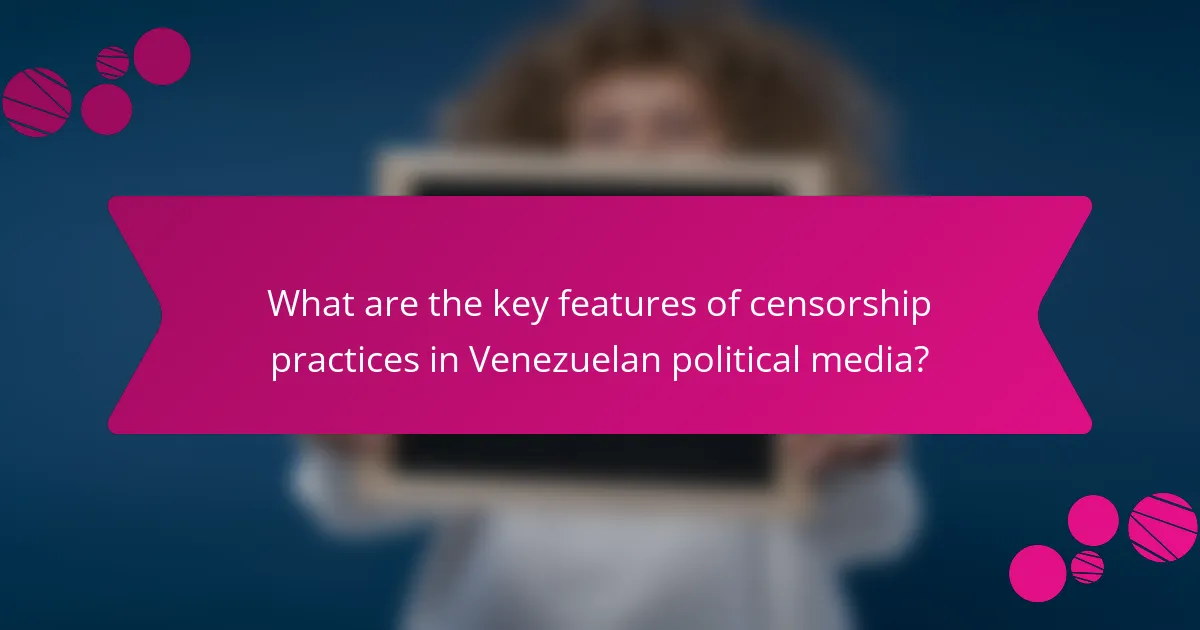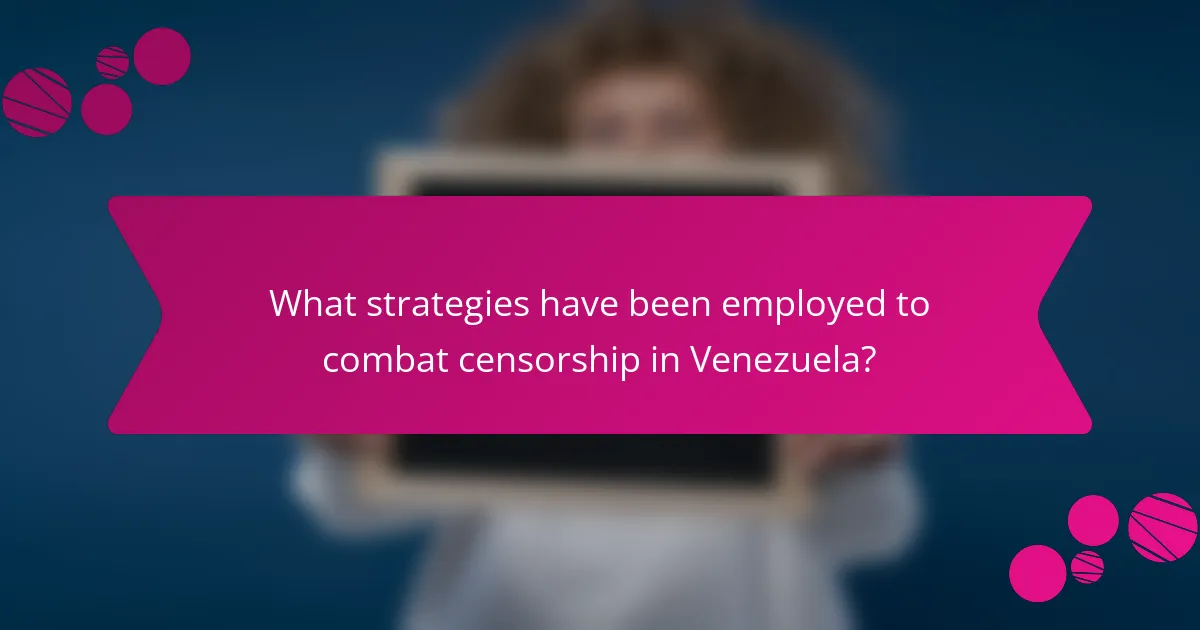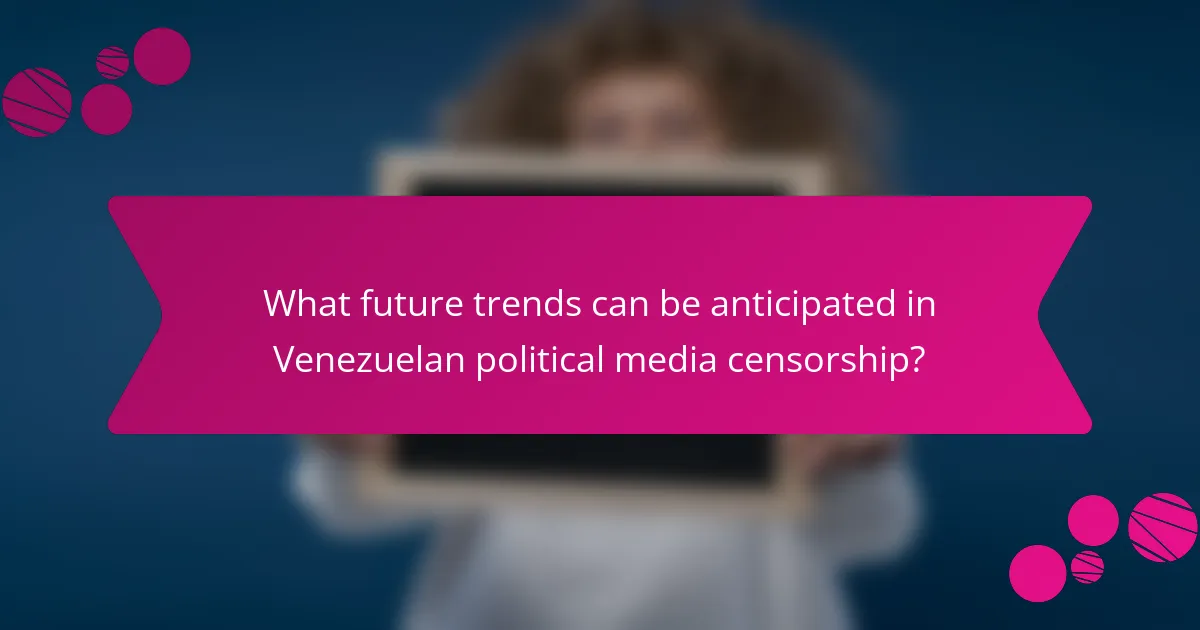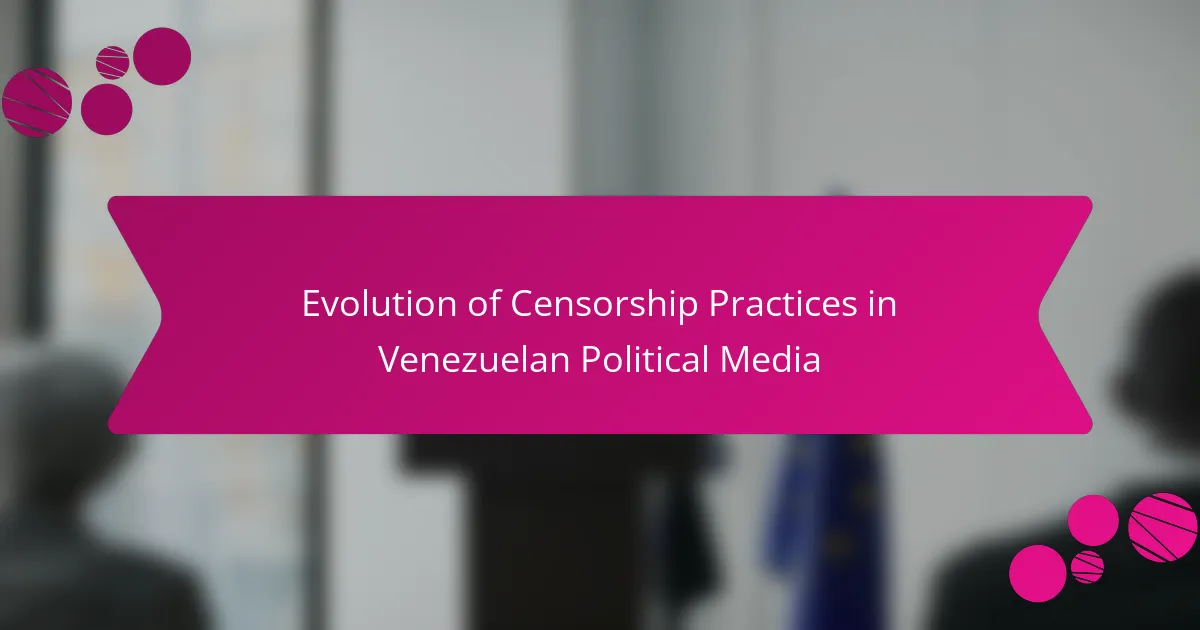
What are the key features of censorship practices in Venezuelan political media?
Censorship practices in Venezuelan political media are characterized by state control, intimidation, and legal restrictions. The government exerts significant influence over media outlets. This influence often manifests through ownership of major media companies. Intimidation tactics include harassment of journalists and threats against dissenting voices. Legal restrictions are enforced through laws that limit freedom of expression. For instance, the Law on Social Responsibility in Radio and Television imposes penalties for broadcasting content deemed harmful to the government. Additionally, many independent media outlets have been forced to close or operate under severe limitations. These features illustrate a systematic effort to suppress dissent and control the narrative in Venezuelan politics.
How has censorship evolved in Venezuela over the years?
Censorship in Venezuela has evolved significantly over the years, particularly since the early 2000s. Initially, the government exercised limited control over media outlets. However, in the late 1990s and early 2000s, President Hugo Chávez began implementing stricter measures. These measures included the closure of critical media outlets and the establishment of laws to regulate content.
By 2007, the government did not renew the broadcast license of the opposition-aligned RCTV, marking a pivotal moment in media censorship. The government justified these actions as necessary to combat misinformation and promote national interests.
Under Nicolás Maduro’s administration, censorship intensified further. The government has employed tactics such as blocking websites, restricting internet access, and detaining journalists. Reports indicate that over 100 media outlets have been forced to close or operate under severe restrictions.
International organizations have condemned these actions as violations of freedom of expression. The evolution of censorship in Venezuela reflects a systematic effort to control information and suppress dissent.
What historical events have influenced censorship in Venezuelan media?
The historical events that have influenced censorship in Venezuelan media include the 2002 coup attempt against President Hugo Chávez. This event led to increased government control over media outlets. Following the coup, Chávez implemented laws that restricted press freedom. The 2007 closure of the RCTV television station exemplified this trend. The government justified the closure by citing the need to combat misinformation. Additionally, the 2015 economic crisis intensified media censorship. The government sought to control narratives surrounding the crisis. These events collectively shaped a landscape of restricted media freedom in Venezuela.
What role do political regimes play in shaping censorship practices?
Political regimes significantly influence censorship practices. Authoritarian regimes often implement strict censorship to control information and suppress dissent. For example, in Venezuela, the government has restricted media access and targeted journalists. This is evident from the closure of independent media outlets and the harassment of reporters. Democratic regimes may also engage in censorship, but typically to a lesser extent and often under the guise of protecting national security or public order. Historical evidence shows that as political power consolidates, censorship practices intensify. In Venezuela, the decline of democracy has corresponded with increased censorship measures.
What are the various forms of censorship observed in Venezuelan political media?
Various forms of censorship observed in Venezuelan political media include direct government control, intimidation of journalists, and restrictions on print and broadcast media. The government exercises direct control over state media, limiting coverage of dissenting views. Journalists face harassment and threats, which suppress critical reporting. Additionally, the government imposes legal restrictions on media outlets, leading to self-censorship. Internet censorship is also prevalent, with blocking of websites that criticize the regime. These practices have been documented by organizations like Human Rights Watch and Reporters Without Borders, highlighting the severe limitations on press freedom in Venezuela.
How does government control manifest in media outlets?
Government control in media outlets manifests through censorship, ownership, and regulation. In Venezuela, the government exerts influence by controlling major media companies. This includes direct ownership of state-run outlets and pressure on private media. Censorship is prevalent, with laws restricting content critical of the government. Journalists face harassment and intimidation for reporting dissenting views. The government also employs tactics like internet shutdowns to suppress information. These practices undermine press freedom and limit public access to diverse viewpoints. Historical instances include the closure of news channels and the arrest of journalists. Such actions illustrate the systematic approach to controlling media narratives in Venezuela.
What are the implications of self-censorship among journalists?
Self-censorship among journalists can lead to a significant reduction in the diversity of information available to the public. This practice often results in the omission of critical news stories that may challenge the status quo. Journalists may avoid sensitive topics due to fear of repercussions, impacting the integrity of news reporting. In Venezuela, self-censorship has been prevalent due to government pressure and threats against media outlets. A study by the Committee to Protect Journalists found that 80% of Venezuelan journalists reported feeling pressured to censor themselves. This environment fosters misinformation and limits public discourse on important issues. Ultimately, self-censorship undermines the role of journalism as a watchdog in society.
Why is understanding censorship in Venezuelan political media important?
Understanding censorship in Venezuelan political media is crucial for grasping the dynamics of information control in the country. Censorship affects public discourse and limits citizens’ access to diverse viewpoints. It plays a significant role in shaping political narratives and influencing public opinion. The Venezuelan government has implemented strict media regulations to suppress dissenting voices. According to a 2021 report by Human Rights Watch, the government has closed down numerous media outlets and restricted internet access. This environment hampers democratic processes and undermines accountability. By studying censorship, observers can better comprehend the challenges faced by journalists and activists. This understanding is vital for advocating for freedom of expression and human rights in Venezuela.
How does censorship impact public perception and political engagement?
Censorship significantly alters public perception and political engagement. It limits access to diverse viewpoints and critical information. This restriction can lead to a misinformed public. When people lack accurate information, they may disengage from political processes. In Venezuela, for instance, government censorship has stifled dissent and manipulated narratives. Studies indicate that media suppression correlates with lower voter turnout. The absence of free expression diminishes trust in institutions. Consequently, citizens may become apathetic toward political participation.
What are the consequences for freedom of expression in Venezuela?
Freedom of expression in Venezuela faces severe consequences. The government has implemented extensive censorship measures. Journalists and media outlets experience intimidation and harassment. Many independent news organizations have been shut down. The state controls most media channels, limiting diverse viewpoints. Self-censorship among journalists has increased due to fear of reprisals. Citizens face restrictions on accessing information and expressing dissent. According to Human Rights Watch, these practices undermine democratic principles and human rights.

What strategies have been employed to combat censorship in Venezuela?
Venezuelan activists and organizations have employed various strategies to combat censorship. They utilize social media platforms to disseminate information widely. This approach circumvents traditional media restrictions imposed by the government. Additionally, they create and share alternative news websites. These sites provide uncensored coverage of political events. Use of virtual private networks (VPNs) helps individuals access blocked content. Activists also engage in international advocacy to raise awareness. They seek support from global organizations to pressure the Venezuelan government. These strategies reflect a persistent effort to maintain free expression despite oppressive censorship.
How have journalists and media organizations responded to censorship?
Journalists and media organizations have responded to censorship by adopting various strategies to circumvent restrictions. They have increased the use of digital platforms to disseminate information. This shift allows for greater reach and accessibility. Many journalists have resorted to anonymous reporting to protect their identities. They often utilize social media to share news and engage with audiences directly. International collaborations have also been established to amplify voices facing censorship. Reports indicate that investigative journalism has intensified in response to oppressive measures. In Venezuela, the rise of independent media outlets has emerged as a direct challenge to state-controlled narratives. These responses highlight the resilience of journalists in the face of censorship.
What role do international organizations play in supporting free media?
International organizations play a critical role in supporting free media by advocating for press freedom and providing resources. They monitor media environments and report violations against journalists. Organizations like UNESCO and the Committee to Protect Journalists promote best practices and offer training. They also engage in diplomatic efforts to influence governments to uphold media rights. For instance, UNESCO’s initiatives include the World Press Freedom Day, which raises awareness about the importance of free media. These organizations often provide funding for independent media projects in restrictive environments. Their efforts contribute to a more informed public and hold governments accountable.
How effective are grassroots movements in challenging censorship?
Grassroots movements are highly effective in challenging censorship. They mobilize community support and raise awareness about censorship issues. These movements often utilize social media to amplify their message. In Venezuela, grassroots organizations have successfully highlighted government censorship. They have organized protests that attract international attention. This visibility pressures authorities to reconsider their censorship practices. Historical examples show that grassroots movements can influence policy changes. The effectiveness of these movements is evident in their ability to unite diverse groups against censorship.
What technological advancements are being utilized to bypass censorship?
Technological advancements utilized to bypass censorship include virtual private networks (VPNs), encrypted messaging apps, and decentralized networks. VPNs encrypt internet traffic, allowing users to access blocked content. Encrypted messaging apps, like Signal, secure communications from surveillance. Decentralized networks, such as Tor, anonymize user data and access blocked sites. These technologies help individuals in Venezuela circumvent government-imposed restrictions on information. Reports indicate increased usage of these tools as censorship intensifies in the region.
How do digital platforms facilitate the dissemination of uncensored information?
Digital platforms enable the dissemination of uncensored information by providing open access to content creation and sharing. They allow users to publish and share information without traditional media gatekeepers. This bypasses censorship typically imposed by governments or institutions. Social media networks, blogs, and independent websites are key examples of these platforms. They facilitate real-time communication and mobilization of information. In Venezuela, platforms like Twitter and Telegram have been crucial for sharing news and organizing protests. Studies show that these tools can significantly increase the visibility of uncensored content. For instance, during political unrest, digital platforms have been used to circulate information that mainstream media may avoid. This capacity for rapid information spread challenges censorship efforts effectively.
What tools are available for journalists to protect their work from censorship?
Journalists can use various tools to protect their work from censorship. Encryption software secures communication and documents, preventing unauthorized access. VPNs (Virtual Private Networks) allow journalists to browse the internet anonymously. Secure file-sharing platforms enable the safe transfer of sensitive information. Whistleblower platforms facilitate confidential reporting of misconduct. Additionally, digital rights organizations provide resources and legal support for journalists facing censorship. These tools help maintain journalistic integrity and freedom of expression in oppressive environments.

What future trends can be anticipated in Venezuelan political media censorship?
Future trends in Venezuelan political media censorship include increased digital surveillance and tighter control over online platforms. The government is likely to enhance its efforts to monitor social media and internet usage. This could involve implementing advanced technologies to track dissent and opposition voices. Furthermore, we may see stricter laws aimed at regulating digital content. The state could expand its influence over private media outlets through ownership or coercion. Historical precedents show that authoritarian regimes often escalate censorship as opposition grows. In Venezuela, the decline of traditional media has already shifted focus to digital censorship. This evolution suggests that the government will continue adapting its strategies to suppress dissent in the digital age.
How might political changes affect censorship practices in the future?
Political changes can significantly influence censorship practices in the future. A shift in government ideology may lead to stricter regulations on media content. For instance, authoritarian regimes often impose heavy censorship to suppress dissent. Conversely, democratic transitions may promote greater freedom of expression and reduce censorship. Historical examples include Venezuela, where censorship intensified under Hugo Chávez’s government. In contrast, periods of political liberalization have seen a relaxation of such practices. Changes in international relations can also impact censorship, as global pressure may encourage governments to adopt more open media policies. Overall, the nature of political changes will determine the extent and form of censorship in the future.
What potential reforms could impact media freedom in Venezuela?
Potential reforms that could impact media freedom in Venezuela include the repeal of restrictive laws. The current legal framework severely limits journalistic activities. Reforms could include decriminalizing defamation and libel. This would reduce the risk journalists face for their reporting. Additionally, reforms could enhance access to information laws. Improved transparency would empower journalists to investigate freely. International pressure for media reforms could also play a significant role. Global advocacy for human rights often influences domestic policies. These reforms could lead to a more open media landscape in Venezuela.
How could global trends in media censorship influence Venezuela?
Global trends in media censorship could significantly influence Venezuela by intensifying existing restrictions on free expression. As countries worldwide adopt stricter media controls, Venezuela may mirror these practices to suppress dissent. The Venezuelan government has historically utilized censorship to maintain control over information. This aligns with global trends where authoritarian regimes limit media access. For instance, the rise of digital surveillance tools has enabled governments to monitor and restrict online content. Reports indicate that Venezuela has increased its use of such technologies. Additionally, international pressure against censorship could lead to reforms or further crackdowns in Venezuela. The influence of global media narratives may also impact local perceptions of censorship. Overall, the interplay between global trends and Venezuela’s media landscape could either exacerbate or challenge the current state of censorship.
What best practices can journalists adopt to navigate censorship challenges?
Journalists can adopt several best practices to navigate censorship challenges effectively. First, they should ensure they are well-informed about the legal landscape regarding press freedom in their region. Understanding local laws helps journalists identify potential risks. Second, they can build networks with other journalists and organizations that advocate for press freedom. Collaboration can provide support and resources. Third, using secure communication tools can protect sensitive information from interception. Tools like encrypted messaging apps enhance confidentiality. Fourth, journalists should practice transparency with their audience regarding potential censorship. This builds trust and awareness among readers. Fifth, they can diversify their sources of information to avoid reliance on government-controlled outlets. This approach enhances the accuracy and richness of reporting. Lastly, journalists should document instances of censorship to raise awareness and advocate for change. Evidence of censorship can serve as a powerful tool in campaigns for press freedom.
How can journalists ensure the safety of their sources in a censored environment?
Journalists can ensure the safety of their sources in a censored environment by implementing secure communication methods. They should use encrypted messaging apps to protect conversations. Anonymity is vital; journalists can avoid revealing the identity of sources in their reports. Establishing trust is crucial; journalists must build relationships with sources over time. They should also use pseudonyms when discussing sensitive information. Additionally, journalists can utilize secure file-sharing services for documents. Regularly updating security practices is necessary to adapt to changing threats. Training in digital security for both journalists and sources can further enhance safety.
What ethical considerations should journalists keep in mind while reporting under censorship?
Journalists reporting under censorship must prioritize accuracy and transparency. They should verify information from reliable sources before publication. Maintaining integrity is crucial, even when faced with restrictions. Journalists must consider the potential consequences of their reporting on public safety. They should balance the public’s right to know with the risks involved in disclosing sensitive information. Upholding ethical standards helps maintain credibility in the face of censorship. Journalists should also advocate for press freedom and seek to challenge unjust censorship practices. Documented cases, such as those in Venezuela, illustrate the importance of these ethical considerations.
The main entity of this article is the evolution of censorship practices in Venezuelan political media. The article examines the key features of censorship, including state control, intimidation of journalists, and legal restrictions that limit freedom of expression. It discusses the historical context of censorship, the role of political regimes, and the various forms of censorship observed in the media landscape. Additionally, it explores the implications of self-censorship, the impact on public perception and political engagement, and strategies employed by activists and journalists to combat censorship. The article highlights the importance of understanding these dynamics for advocating freedom of expression and human rights in Venezuela.
